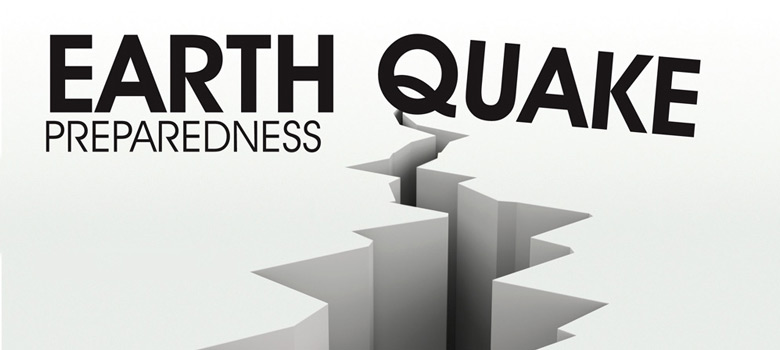
There may be simple actions you can do right now that will protect you if an earthquake happens tomorrow. START NOW by moving furniture such as bookcases away from beds, sofas, or other places where people sit or sleep. Move heavy objects to lower shelves. Then begin to look for other items in your home that may be hazardous in an earthquake.
In the kitchen
Unsecured cabinet doors fly open during earthquakes, allowing glassware and dishes to crash to the floor. Many types of latches are available to prevent this: child-proof latches, hook and eye latches, or positive catch latches designed for boats. Gas appliances should have flexible connectors to reduce the risk of fire. Secure refrigerators and other major appliances to walls using earthquake appliance straps.
Objects on open shelves and tabletops
Collectibles, pottery objects, and lamps can become deadly projectiles. Use either hook and loop fasteners on the table and object, or non-damaging adhesives such as earthquake putty, clear quake gel, or microcrystalline wax to secure breakables in place. Move heavy items and breakables to lower shelves.
Hanging objects
Mirrors, framed pictures, and other objects should be hung from closed hooks so that they can’t bounce off the walls. Pictures and mirrors can also be secured at their corners with earthquake putty. Only soft art such as tapestries should be placed over beds or sofas.
Electronics
Televisions, stereos, computers and microwaves and other electronics are heavy and costly to replace. They can be secured with flexible nylon straps and buckles for easy removal and relocation.
Furniture
Secure the tops of all top-heavy furniture, such as bookcases and file cabinets, to a wall. Be sure to anchor to the stud, and not just to the drywall. Flexible fasteners such as nylon straps allow tall objects to sway without falling over, reducing the strain on the studs. Loose shelving can also be secured by applying earthquake putty on each corner bracket.
In the garage or utility room
Items stored in garages and utility rooms can fall, causing injuries, damage, and hazardous spills or leaks. They can also block access to vehicles and exits. Move flammable or hazardous materials to lower shelves or the floor.
Water heater
Unsecured water heaters often fall over, rupturing rigid water and gas connections. If your water heater does not have two straps around it that are screwed into the studs or masonry of the wall, then it is not properly braced. This illustration shows one method of bracing a water heater. Bracing kits are available that make this process simple. Have a plumber install flexible (corrugated) copper water connectors, if not already done.
Is your home earthquake safe? Put what you just learned to the test! Please take a few minutes and enjoy this fun and interactive quiz by clicking the link below –
http://www.dropcoverholdon.org/beatthequake/game/
Leave a Reply
You must be logged in to post a comment.